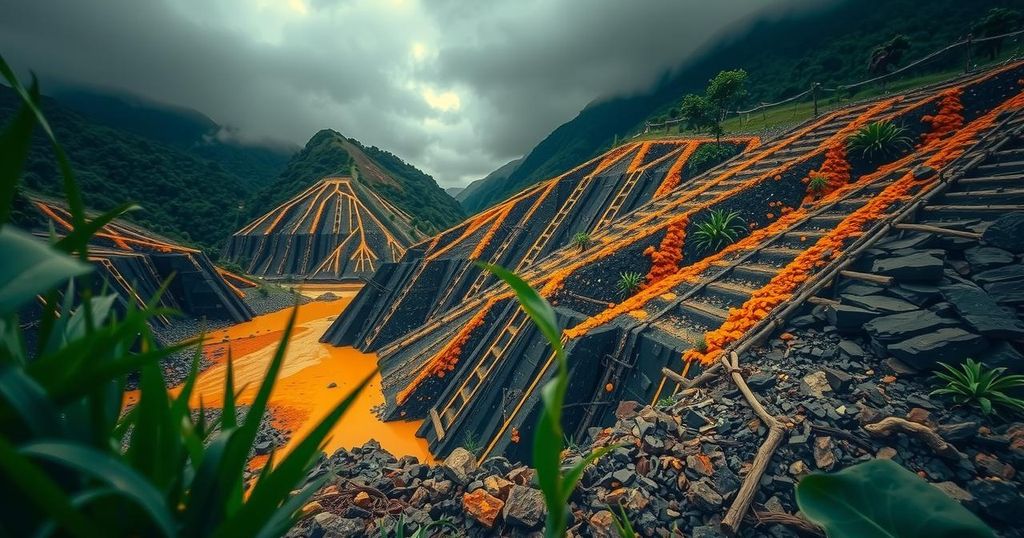The mining sector in Peru is facing a crisis as the Reinfo initiative, aimed at formalizing informal miners, is accused of facilitating illegal mining. The program’s enforcement has been criticized, with many registered entities failing to comply with mandatory reporting. As illegal mining continues to thrive, impacting the environment and local economies, debates in Congress highlight the need for substantial reform to address this ongoing issue effectively.
The mining sector in Peru is undergoing significant turmoil as the government’s initiative, the Registro Integral de Formalización Minera (Reinfo), aimed at formalizing informal miners, faces scrutiny for potentially enabling illegal mining operations. Established in 2012, Reinfo is intended to assist small-scale miners but has recently come under fire due to rampant noncompliance; investigations revealed that more than 5,800 registered entities did not submit required production reports. Critics claim the program’s ineffectiveness exacerbates the illegal mining crisis, leading to substantial environmental degradation and economic losses.
In Congress, the debate over Reinfo continues to ignite division among lawmakers, with proposals for extending the program meeting significant opposition. Critics assert that further extensions would only empower illegal mining factions, as articulated by Congresswoman Diana Gonzales, who described Reinfo as “a gateway for criminal activities.” Meanwhile, concerns about political influence persist, particularly regarding the involvement of Eduardo Salhuana, a legislator allegedly linked to illegal mining ventures.
The economic repercussions of illegal mining are considerable, generating upwards of $8.2 billion annually, overshadowing the narcotics trade. In regions such as Madre de Dios, stark discrepancies exist between official gold production statistics and actual data from independent sources. The repercussions are dire, with over 100,000 hectares of forest destroyed and significant contamination of local waterways from harmful substances like mercury.
Humanitarian issues have also arisen; recent violence linked to illegal mining has highlighted the dangers faced by those who stand against it. The tragic murder of Victorio Dariquebe Gerewa, an indigenous park ranger, serves as a sobering reminder of the risks involved in defending against illegal mining operations. His death catalyzed outrage among indigenous groups, who continue to demand accountability and justice amidst ongoing threats.
Protests have erupted among small-scale miners advocating for a two-year renewal of Reinfo to allow for completing the formalization process, underscoring the tension between regulatory efforts and the need for support for these miners. As illegal gold mining continues its unchecked spread, particularly through river mining in tropical areas, the government’s commitment to confronting these issues is increasingly critical.
Peru’s experience emphasizes that although initiatives like Reinfo aim to integrate informal miners into the legal framework, insufficient oversight can inadvertently perpetuate environmental and social harm. Without substantial reforms to tackle the root causes of illegal mining, the country risks perpetuating cycles of exploitation and ecological devastation.
Peru has long struggled with illegal mining practices, especially in its vast, biodiverse territories. The Reinfo program was instituted to formalize the status of small-scale and artisanal miners who operate outside legal boundaries, aiming to legitimize their activities and ensure environmental protections. However, the program’s provisions have come under scrutiny as investigations indicate widespread noncompliance and ineffective regulatory frameworks. The implications of illegal mining extend beyond environmental damage, affecting local economies and human rights, particularly in indigenous communities, which face violence and exploitation from organized crime linked to mining activities. The situation is further complicated by political dynamics within Peru’s Congress, raising concerns about potential corruption and the influence of individuals with vested interests in mining operations. As illegal mining networks thrive, the consequences cascade into broader social and economic challenges for the nation, necessitating urgent action from the government and civil society.
In conclusion, Peru’s mining sector stands at a critical juncture, grappling with the consequences of illegal mining amid attempts to reform its practices through the Reinfo initiative. While the intentions behind Reinfo were to support informal miners, the current reality reveals significant gaps in enforcement and oversight, leading to widespread noncompliance and environmental devastation. Legislative debates highlight the tensions between regulatory measures and the entrenched power of illegal mining networks. Ultimately, robust reforms are essential to mitigate the detrimental effects of illegal mining on Peru’s environment, economy, and social fabric, ensuring a sustainable future for its communities.
Original Source: www.intellinews.com






